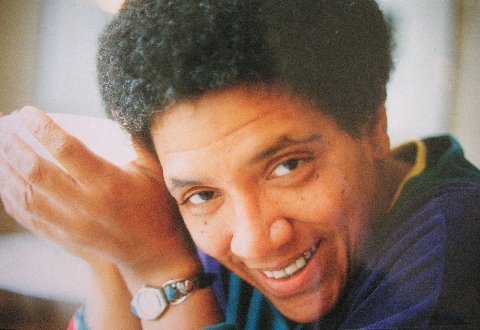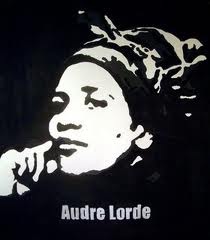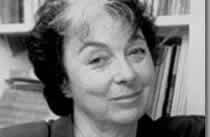
The Reception of Audre Lorde – The Berlin Years 1984 to 1992 – Voices From
Around The World
Dagmar Schultz, February 18, 2014 | Feminist
Wire
When Audre first arrived in Berlin in 1984, I was the co-publisher of Orlanda Press (then sub rosa Frauenverlag) and we published several of Audre’s books in German. She came to Berlin each year until 1992 (except for 1985 when she was at the anthroposophic Lukas Clinic in Switzerland). One of Audre’s first questions upon arriving in Berlin was, “Where are the Black Germans?” She soon established close contact with Black women, some of whom attended her classes at the Free University of Berlin in 1984. As a result, we published the book Showing Our Colors: Afro-german Women Speak Out in 1986. more…

Audre
Lorde: The Berlin Years
Donna Maria Alexander, Monday, March 10th, 2014 | Americas Studies
I first saw Audre Lorde: The Berlin Years (2012) when it was screened at the FWSA Biennial Conference in June 2013 at the University of Nottingham. The film focuses on the time the African American, feminist, lesbian, warrior, poet, Audre Lorde spent travelling back and forth to Berlin between 1984 and 1992, and her influence on the Afro-German community.
 FIGHT THE PATRIARCHAL POWER
FIGHT THE PATRIARCHAL POWER
ILY GOYANES
Black woman, lesbian, militant feminist, librarian, poet, mother, warrior,
cog in the radical machine of the late ’60s and early ’70s—Audre Lorde (1934-1992) was all of those things
and more. Lorde was involved with both the black liberation and feminist movements, and her work transcends
gender and race, speaking loud and proud to anyone who’ll listen. Think of her as the queer Maya Angelou—except
she was the type to take a chain saw to the cage and let that motherfuckin’ bird sing free.
The Miami Gay and Lesbian Film Festival brings Lorde alive with Audre Lorde: The
Berlin Years. The film discusses Lorde’s influence as an activist and writer,
as well as her relationship to the German black diaspora, the development of the Afro-German movement,
and the beginning of the anti-racist movement. Get your entitled ass to the Museum
of Contemporary Art (770 NE 125th St., North Miami) for a reception from 6 to 7 p.m.,
followed immediately by a screening of the film. If you feel like pumping your fist in
the air, donning a beret, and taking down the patriarchal establishment after the film, head to
Luna Star Café (775 NE 125th St., Miami Shores) for a Q&A at 9 p.m. The screening is
free with museum admission, which costs $5 for adults and $3 for seniors and students. Visit mocanomi.org or mglff.com.
 makeshiftmag.com
makeshiftmag.comAlexis Pauline Gumbs
…As a film created by a white German feminist colleague and comrade of Lorde’s, the film importantly includes many of Lorde’s imperatives to white feminist would-be allies, whom Lorde called on urgently during a time in Berlin, much like today, when neo-Nazi violence against people of color and immigrants made clear the genocidal persistence of white supremacy. Schultz shows Lorde talking to packed rooms of mostly white women in the tone of tough love and outrage. I know that many women of color who are tired of telling white feminists what Audre Lorde and many other feminists of color have already stated so clearly hope that our would-be allies will pay special attention to these moments in the film. … (download here)

Interview with Dred Scott Keye's: The Cutting Edge, WBAI, NYC

You Should Go: Audre
Lorde, Stand Tall Wine and Open Mic in Miami
The documentary itself is about Audre Lorde’s final years in Berlin and chronicles an untold chapter of Lorde’s
life: her empowerment of Afro-German women, as she challenged white women to acknowledge the significance
of their white privilege and to deal with difference in constructive ways. It’s going to be amazing because
it will be one of the few social events that support a creative atmosphere for young queer women of color
in Miami, where we can actually meet and talk to each other without screaming over booming club beats. Developing
this new community will also tell our local gay organizations and businesses that there is an audience for
this type of social event, and to produce more! We are having an open mic after to continue the creative vibe
well into the evening!

kpfa
Women's Magazine:
Focus on Film •
March 25, 2013—1:00
p.m.
Director Dagmar Schultz and co-author Ika Hügel-Marshall speak with Paola Bachetta
about their film Audre Lorde: The Berlin Years. This unique film documents the time that
Black feminist icon Audre Lorde spent in Berlin between 1984 and 1992. Her presence there helped
to build a community of Afro-German women. She also challenged white feminists to acknowledge
the significance of their white privilege and to deal with difference in constructive ways. The
film will screen at Oakland's Parkway Theater on March 31.![]()

The
Shape of My Impact
Alexis Pauline Gumbs (Audre Lorde Papers, Spelman
College Archive)
“I love the word survival, it always sounds to me li5e a promise. It makes me wonder sometimes though, how do I define the shape of my impact upon this earth?” –reflection cut from an early draft of “Eye to Eye: Black Women, Hatred and Anger” by Audre Lorde (Audre Lorde Papers, Spelman College Archive) (download here)
 Audre
Lorde—Her Years in Berlin “The political and social situation in Berlin and to an even greater
extent in the rest of Germany is a nightmare. And what makes it worse is the overlay of pleasantness
it is still quite possible to find. The only real hope is the growing horror of groups of people
like the healing practitioners, the small publishers, the social workers, women’s groups etc,
but those grassroots outcries and demonstrations are coming together really slowly, it takes a
lot to galvanize them because in many cases they really do not believe their own history.” Audre
Lorde, in a Letter to fellow poet Adrienne Rich, Sept 20, 1992 (download
here)
Audre
Lorde—Her Years in Berlin “The political and social situation in Berlin and to an even greater
extent in the rest of Germany is a nightmare. And what makes it worse is the overlay of pleasantness
it is still quite possible to find. The only real hope is the growing horror of groups of people
like the healing practitioners, the small publishers, the social workers, women’s groups etc,
but those grassroots outcries and demonstrations are coming together really slowly, it takes a
lot to galvanize them because in many cases they really do not believe their own history.” Audre
Lorde, in a Letter to fellow poet Adrienne Rich, Sept 20, 1992 (download
here)
'Audre Lorde: The Berlin Years 1984 to 1992': Interview with Dagmar Schultz, By Ellise Fuchs (download here)

Audre
Lorde Film Presents Poetry in Action
… Laughing, Schultz recounted how Lorde later
told her that upon meeting Schultz, Lorde thought
of her as a “lesbian CIA agent.” Through Schultz’s persuasion, Lorde accepted
a post at the German Free University, where she taught for
a semester, giving writing workshops and helping to launch
the Initiative of Black Germans (IBG). (download
here)
 The
festival—which has traveled to other parts of the United States—featured a book reading,
film screenings and Q&A sessions with author Ika Hugel-Marshall
and filmmaker and lesbian activist Dagmar Schultz. -Windy
City Times (download here)
The
festival—which has traveled to other parts of the United States—featured a book reading,
film screenings and Q&A sessions with author Ika Hugel-Marshall
and filmmaker and lesbian activist Dagmar Schultz. -Windy
City Times (download here)TGLFF
Torino Gay and Lesbian Film Festival 2012:
Dagmar Schultz e Ika Huegel-Marshall
Published on Apr
24, 2012
Ellise Fuchs intervista Dagmar Schultz e Ika Huegel-Marshall
regista e co-autrice del documentario "Audre Lorde - Die berliner Jahre 1984 bis 1992" |
Ellise Fuchs interviews Dagmar Schultz and Ika Huegel-Marshall director and co-author of the documentary "Audre
Lorde - Die berliner Jahre 1984 bis 1992"
 Dagmar Schultz’s witty, engaging,
humorous, and loving documentary on Audre Lorde felt both timely
and nostalgic at the same time. Timely, because it reminded
me of the fragility of the feminist movement and the current
attempts by many American politicians to undermine it. Timely
because of the ongoing conversations and debates about immigration
in Europe in light of the recession. Timely for me because
of all the films I’ve seen this year about artists who speak
out for a living (Ai
Wei Wei, Iranian
directors, Marjane
Satrapi, et al.) ~Leonine
Films (downlod
here)
Dagmar Schultz’s witty, engaging,
humorous, and loving documentary on Audre Lorde felt both timely
and nostalgic at the same time. Timely, because it reminded
me of the fragility of the feminist movement and the current
attempts by many American politicians to undermine it. Timely
because of the ongoing conversations and debates about immigration
in Europe in light of the recession. Timely for me because
of all the films I’ve seen this year about artists who speak
out for a living (Ai
Wei Wei, Iranian
directors, Marjane
Satrapi, et al.) ~Leonine
Films (downlod
here)
New Audre Lorde film
looks at her time in Berlin
by
Steven Chaitman
"The Berlin Years" shows both the public and private side of Lorde, a self-described "Black, lesbian, feminist, mother, poet" in the years before she lost her battle with cancer in 1992. It features never-before-seen videos, images and audio recordings of Lorde collected by the filmmaker Dagmar Schultz a now-retired professor, publisher and author from Berlin. (download here)
 “…I
wanted very
much to do justice to what is obviously a labor of love
and to Audre Lorde's legacy in general. This film truly captures
what a delightful spirit she was/is. That's what I love so
much about it—how it shows Lorde’s personality. Thank
you again!”~ Akiba
Solomon (download
here)
“…I
wanted very
much to do justice to what is obviously a labor of love
and to Audre Lorde's legacy in general. This film truly captures
what a delightful spirit she was/is. That's what I love so
much about it—how it shows Lorde’s personality. Thank
you again!”~ Akiba
Solomon (download
here) …During her time in Berlin she helped
give voice to a small community of Black Germans who discovered
themselves and each other. She also correctly predicted with
the fall of the Berlin Wall and the reunification of the two
Germany’s, that a time of extreme nationalism with a concurrent
rise in racism would soon develop.…Victor's
Movie Reviews (download
here)
…During her time in Berlin she helped
give voice to a small community of Black Germans who discovered
themselves and each other. She also correctly predicted with
the fall of the Berlin Wall and the reunification of the two
Germany’s, that a time of extreme nationalism with a concurrent
rise in racism would soon develop.…Victor's
Movie Reviews (download
here) Documentary Film: Audre
Lorde -The Berlin Years 1984 to 1992
Documentary Film: Audre
Lorde -The Berlin Years 1984 to 1992“Lorde’s own voice shines through this inspiring film, filling us with her poetry and conviction.” ~Fringe! Film Festival
 "Things
you should know about Audre Lorde: she loved flowers, she had a deadpan sense of humor,
and after her cancer diagnosis, she believed that being in Berlin
added years onto her life.— TRISTA
S. KENDALL(download
here)
"Things
you should know about Audre Lorde: she loved flowers, she had a deadpan sense of humor,
and after her cancer diagnosis, she believed that being in Berlin
added years onto her life.— TRISTA
S. KENDALL(download
here) Audre Lorde: Black,Feminist, Lesbian,
Poet, Mother,Essayist, Activist…….curvedmarginz (download
here)
Audre Lorde: Black,Feminist, Lesbian,
Poet, Mother,Essayist, Activist…….curvedmarginz (download
here) Fringe!
London’s Gay Film Festival
Fringe!
London’s Gay Film Festival
Sara Ahmed
Hello and welcome. My name is Sara Ahmed and I am delighted and honoured to introduce this film, Audre Lorde: The Berlin Years directed by Dagmar Schultz, and premiering in the UK today as part of Fringe! London’s Gay Film Festival. (download here)
 Audre
Lorde - The Berlin Years 1984-1992
Audre
Lorde - The Berlin Years 1984-1992We have to fight for the "other" poet activist Audre Lorde (1934-1992) would say. Whether of color or a minority, to her, a person of any race was no less affected by the racial prejudice perpatrated on others. "One opression does not justify another" she said. (download here)
 This documentary incorporates
archive material and interviews with Dagmar Schultz’s previously
unreleased personal video archive, creating a portrait fortified
by activism and stunning in its insight into her private world.
Lorde’s own voice shines through this inspiring film, filling
us with her poetry and conviction.
This documentary incorporates
archive material and interviews with Dagmar Schultz’s previously
unreleased personal video archive, creating a portrait fortified
by activism and stunning in its insight into her private world.
Lorde’s own voice shines through this inspiring film, filling
us with her poetry and conviction. Film
and culture festival honors modern heroine
Film
and culture festival honors modern heroineThe Audre Lorde film and cultural festival payed homage to the lesbian, black, female activist. (download here)
 Pride
on Film: Audre Lorde – The Berlin Years 1984 to 1992
(download
here)
Pride
on Film: Audre Lorde – The Berlin Years 1984 to 1992
(download
here)
Two Women Artists: Audre Lorde and Dagmar Schultz. Florence Howe (download here)
 FILM SCREENING/DISCUSSION: Co-sponsored
by the Rosa Luxemburg Foundation and The Audre Lorde Project
FILM SCREENING/DISCUSSION: Co-sponsored
by the Rosa Luxemburg Foundation and The Audre Lorde ProjectAudre Lorde - The Berlin Years 1984-1992: Tina Campt, Ika Hugel Marshall, Dagmar Schultz (download here)
 Audre
Lorde - The Berlin Years 1984 to 1992 (download
here)
Audre
Lorde - The Berlin Years 1984 to 1992 (download
here)Berlinale Panorama Director, Wieland Speck, discusses 2012 programme (download here) (scroll down 3/4 of the page)
What can the gay movement learn from other social movements?
I wish I could answer this question more directly. Unfortunately, it’s not that clear-cut. Nonetheless, one could actually get that impression, when one watches the German entries in the programme, particularly when it comes to the documentaries: We have two films about the history of the two gay movements in Germany: Unter Männern - Schwul in der DDR (Among Men - Gay in East Germany) and Detlef. You might not have guessed it, but there was a radical, political gay movement in Bielefeld in the 1970s, in which the key figure was even called Detlef. Detlef Stoffel. The two films are especially interesting in combination, because one can read East and West side by side. In Vito, as well, gay history unfolds through a particular person, though in this case in the USA. In the 1980s, Vito Russo held his famous lecture “The Celluloid Closet” in Panorama, which was called the Info-Schau at the time. The film by the same name became a mainstay of queer film history and received the TEDDY in 1996.
I believe that many different movements can learn from one another. The documentary Audre Lorde - The Berlin Years. 1984-1992by Dagmar Schultz shows this with great urgency: Audre Lorde is a black, lesbian feminist, poet, author and human rights campaigner
 Third
World Newsreel Acquires "Audre Lorde - The Berlin Years
1984 to 1992" For March Release + Trailer
Third
World Newsreel Acquires "Audre Lorde - The Berlin Years
1984 to 1992" For March Release + Trailer